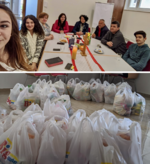Land in sight?
After weeks of lockdown, partial openings have been decided and implemented in numerous European countries. However, even if there may be silver lining on the horizon - the reality still looks very difficult for many people.
In a report, Martin Konev, project manager of the Miss Stone Center in Strumica (North Macedonia), mentioned reasons to thankfulness: among the approximately 200 people who receive regular help through the “Meals on Wheels” program, the home care ministry and the “Warm Meal for Radovish” program, no infections caused by the Corona virus have so far occurred. The employees have also been able to protect themselves effectively thanks to the comprehensive safety measures that have been enacted.
The supply shortfall with regard to food could also be overcome. The markets and shops have reopened, and almost all food is available again. Many products are, however, currently more expensive than they have been before. Since the Miss Stone Center is able to provide its employees with a special permit to travel to and from work and to move around while helping the people in need, restrictions on freedom of movement are not an insurmountable obstacle.
However, it is difficult and costly to purchase the disposable containers for the “Meals on Wheels” program that are needed in order to comply with hygiene regulations. The Miss Stone Center has bought up almost everything that was in stock in the warehouses in North Macedonia in order to remain capable of acting and to continue being able to help those in need.
In Albania, North Macedonia’s neighboring country in the west, there are regional differences with regard to freedom of movement. Tirana and Durrës, with the highest infection rate in the country, are considered “red” areas, while Elbasan, Pogradec and Librazhd have been classified as “green” areas. This means that in the latter places, small groups of the United Methodist congregations may meet again. Pastor Mustafa Isufi therefore invites three or four families several times a week to the church in Pogradec so that they can read the Bible together, pray - and enjoy a coffee. Signs of a cautious opening are also loosening of the curfew. Travelling and walking is now allowed in the “green” areas; in the “red” areas, however, driving is still forbidden, and going out is only possible with a special permit. Those responsible in the congregations are strongly and creatively committed to strengthening the connection in these difficult times and to spreading the Gospel - also with very concrete actions. Many people who had just recovered from the consequences of the earthquakes in November 2019 have now lost their jobs and income as a result of the Corona crisis. There is no social plan for them. And so, the responsible persons of the UMC try to give an encouraging and helpful sign of hope and love by handing out food parcels.
In Romania, the leaders of the local church in Cluj are in contact with children in an orphanage through a diaconal organization. For five young women who have outgrown their orphanage, they have rented an apartment so that they can have a place to stay during this difficult time. Three young single mothers are also being supported. They also have outgrown their former home - and they neither receive support from the fathers of their children nor can they find a job in the current situation that would help them to stand on their own feet. Finally, around 30 Roma families in villages around Cluj-Napoca have received food and hygiene packages - a relief action that is to continue in the coming weeks.
Electronic media are also regularly used in Serbia to provide people with the opportunity to take part in worship services. Due to severe postal restrictions, the telephone became an even more important tool for mutual encouragement and sustainable connection. Another instrument of fellowship was, for instance, a “worship bulletin” that was regularly produced and personally distributed in Kisac. Again and again it became clear how much the people in this very difficult situation miss the common services or even singing together. The longing is great to be allowed to gather again - if necessary also in the garden, where larger distances can be kept. The very strict curfew (12 hours on weekdays, 24 hours on weekends) has now been eased somewhat, but it is still unclear when and under what circumstances services can be held again. Or whether, for example, the kindergarten KORAB in Pivnice can be opened again before the end of the current school year.
Whether in North Macedonia, Albania, Romania or Serbia: the leaders of the UMC prove time and again that love is not a question of size. And because they do so, people can breathe a sigh of relief and draw hope for their own way into a future that, despite signs of relaxation, is still uncertain.
Urs Schweizer
Assistant to Bishop Patrick Streiff

